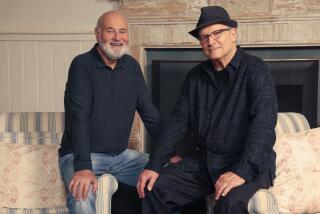THE ULTIMATE ‘ULTIMATE SOLUTION’ . . . OR IS IT?
About 15 years ago, as legend has it, an ambitious screenwriter crept up to a fence surrounding the Bel-Air home of movie director George Cukor and tossed a small package into Cukor’s garden.
In the package was a script. In the garden was Cukor’s guest, a famous actress. In the writer’s head was a familiar dream.
The dream was that the script, “The Ultimate Solution of Grace Quigley,” and the actress, Katharine Hepburn, would get together and that he, Martin Zweiback, TV writer, would get to direct the movie.
It is easy to imagine Zweiback’s mind racing ahead to the end of the fantasy, to the night when he would go on stage at the Dorothy Chandler Pavilion and thank everyone from his wife to Cukor’s gardener for his Academy Award.
But, who was it that said, “A dream is only a nightmare with a happy ending?”
For most of the past 15 years, Zweiback’s half-realized dream has kept him up nights. Hepburn did read the script, a dark comedy about an elderly woman who becomes the adopted mother of the hit man (Nick Nolte) she hires to kill her, and she did agree to play the role written for her.
But it took 12 years to get it financed (by Cannon Films), then Hepburn insisted on working with an experienced film director. That director, Anthony Harvey, for whom Hepburn had worked in “The Lion in Winter,” had other ideas about the story’s message.
“I wrote a story about the freedom of choice,” says Zweiback, who eventually settled for a sole writing credit and a share of the producer title with his wife Adrienne. “He made a movie about the joy of killing.”
Harvey’s first cut of “Ultimate Solution” was shown at Cannes in 1984 and got a quick roasting by film critics there. A year later, with a completely different ending (a minor change: in the first cut, the old lady and her doting hit man both die; in the last one, they live happily ever after) it was released on the East Coast and got roasted all over again.
Worse, it did no business.
“It didn’t even make enough money to cover the cost of its newspaper ads,” says Cannon President Menahem Golan. “No one wanted to see this movie.”
Zweiback, sounding a common writer’s refrain, blames the director’s interpretation of his story for its lack of commercial appeal and tried for more than a year to get Cannon to release a version that he had edited.
This is a new concept, a “writer’s cut,” and any director reading this paragraph right now must be gasping at the prospects. Studio executives have cut their films. The wives of studio executives have cut their films. Now, the writers are going to cut them?!!
Nonetheless, Zweiback got Cannon to give him the scissors for a few hours and last month his version was given a 10-day commercial run here in order to qualify it for the 1985 Academy Awards.
His hopes for the film were buoyed by glowing local reviews, and for the last few weeks, Zweiback has been scrambling to rent theaters into which he could herd academy members for a pre-ballot look. Tonight, on the eve of the nominations’ voting deadline, Zweiback hosts one last screening for academy members in the Fine Arts Theatre.
If he manages to wring a nomination or two out of “Ultimate Solution” (you’d have a better bet taking New England and giving the Bears points in Sunday’s Super Bowl), he believes Cannon might release his version again, maybe even make it available on videocassette.
Golan says there is no chance of either of those things happening. The film has played out theatrically and the video and cable rights have been sold.
Besides, says Golan, despite the good local reviews, Zweiback’s “Ultimate Solution” fared even worse at the box office in Los Angeles than Harvey’s version did in the East.
Golan says he agreed to allow the writer to re-cut the film out of deference to him (“He did write the material and we appreciated his work,” Golan says) and because the movie had done poor business. Golan says that, as a matter of fact, Hepburn, Nolte and Cannon executives all liked Harvey’s version.
“We are proud to have been involved in the film,” says Golan, whose company has risked money on a number of commercial long shots in an attempt to erase its exploitation image. “It was a great prestigious honor for us to work with Katharine Hepburn.
“It’s an unfortunate situation,” Golan went on, “when a producer who is also the writer of the material cannot see eye to eye with the director.”
Worse than that, says Zweiback: “It was a nightmare.”
More to Read
Only good movies
Get the Indie Focus newsletter, Mark Olsen's weekly guide to the world of cinema.
You may occasionally receive promotional content from the Los Angeles Times.










